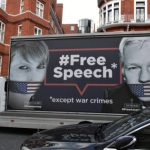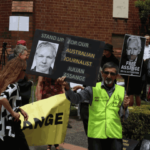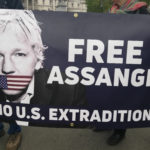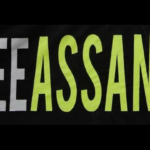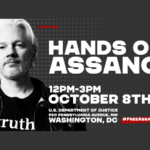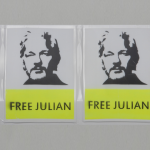The Belmarsh Tribunal: “In Short, Free Julian Assange, Without Further Unconscionable Delay.”
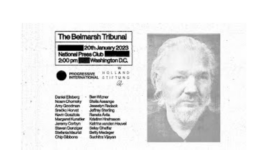
The Belmarsh Tribunal sat for the fourth time last Friday, 20 January, in Washington DC to discuss the global crackdown by state actors against journalists, sources and their publishers, with a focus on the extralegal attempt to extradite Julian Assange to the US to face multiple espionage charges.
As co-chair of the Belmarsh Tribunal, Democracy Now host Amy Goodman made clear it’s “not just critical to talk about freedom of the press, but it is critical to talk about the right of the public to have access to information that is why freedom of the press is so important”.
“A landmark case in this campaign is that of Julian Assange, the publisher who founded WikiLeaks, exposed crimes of the United States government and now faces 175 years in prison if extradited by Britain from the Belmarsh Prison, where he is currently being held,” Goodman further outlined.
The current tribunal has been modelled on the 1960s War Crimes Tribunals held by philosophers Bertrand Russell and Jean-Paul Sartre, along with a number of other leading intellectuals of the time, which served to evaluate US foreign policy and the nation’s operations in Vietnam.
And prior to a range of intellectuals speaking, Goodman noted that the Biden administration continues the Trump era pursuit of Assange, as Congress looks the other way, and the global mastheads that worked to publish the leaks alongside Assange have only just spoken out in support.
Extraterritorial criminal jurisdiction
“No government in any kind of system will voluntarily expose its own crimes,” said director of the American Civil Liberties Union (ACLU) Speech, Privacy and Technology Project Ben Wizner, adding that such exposure relies on sources and publishers, which government now classes as conspiracy.
“Of course, it was a conspiracy: good investigative journalism is always a conspiracy. It’s a conspiracy to end the monopoly on information that government’s control and to give people the seat at the table that they must have, in order to be able to judge powerful people and hold them accountable.”
Wizner pointed out that the US indictment against Assange involves, for the first time, Washington having charged a collaboration between a whistleblower and a publisher as a criminal conspiracy under the Espionage Act 1917 (US).
The rights advocate then asks what the world would still be in the dark about if these journalist-source collaborations didn’t exist, and he lists things like the US government barbarising prisoners, that the innocent die in drone strikes and that mass surveillance has been deployed, as examples.
“This is an attack on press freedom globally,” Wizner warned. “And that is because the United States is advancing what is really the extraordinary claim that it can impose US criminal secrecy laws on a foreign publisher who is publishing outside the United States.”
A departure from precedent
Last week’s meeting was convened under the title the Belmarsh Tribunal, as Assange has been held in the London prison of the same name since April 2019, as he faces US extradition on an 18 charge indictment, which carries 175 years imprisonment, for having published thousands of leaked cables.
Known as the greatest whistleblower of last century, Daniel Ellsberg leaked the Pentagon Papers, a secret report on US government lies about the war in Vietnam, to the New York Times in 1971, which saw him facing trial on charges carrying 115 years inside, which were ultimately dropped.
Ellsberg told the tribunal audience that one of the “foundation stones” of US democracy is the First Amendment of the US Constitution that prevents laws being passed that would breach freedom of speech or that of the press, which means the US has no Official Secrets Act like Britain does.
So, then US president Richard Nixon in the early 70s attempted to prosecute Ellsberg over the leaks under the Espionage Act, which is meant to target spies, as there wasn’t any legislation to protect classified US government documents in the same way as the British official secrets laws do.
Ellsberg’s charges were dropped due to the extralegal nature of the investigation carried out against him. But the Espionage Act has been used on dozens of other whistleblowers since his trial, and, as he points out, now is the first time it’s been used on someone from the media, like Assange.
This is a “blatant violation of the First Amendments denial of Congress’ ability to criminalise acts by journalists”, the renowned whistleblower underscored.
And as he sees that, with the attempted prosecution of Assange, “the First Amendment is essentially gone”, despite it being what the 18th century War of Independence was fought over. And if the case continues, it marks a “major change” in the way the US government operates.
“We are no longer really a republic or a democracy. We have monarchical powers and imperial powers formally,” Ellsberg made clear. “And every empire requires secrecy to cloak its acts of violence in maintaining empire.”
No place in a free society
Last June saw then UK home secretary Priti Patel sign off on Assange’s extradition to the US, following the UK High Court having approved the move. The Australian journalist’s legal team has now filed to appeal this decision to the British High Court and the European Court of Human Rights.
Meanwhile, in Australia, there have been a number of predictions made suggesting the tide is turning for Assange under Albanese, who has stated he’s attempting backdoor diplomacy. Yet, many questions remain regarding whether anything tangible is actually happening behind the scenes.
Leading US dissident Noam Chomsky gave the final word at the Belmarsh Tribunal, as he condemned the Espionage Act as having “no place in a free and democratic society” and added that it shouldn’t be much of a surprise that the act of journalism is now under attack.
Chomsky termed the indictment a crime, explaining that its disgraceful application is compounded further by the years of “imprisonment and torture” that Townsville-born Assange has had to face initially locked up for seven years in the Ecuadorian embassy and now close to four in Belmarsh.
“The targets of the indictment, however, reach far beyond their immediate victim. They reach, in fact, to all of us, who hope to understand what is happening in the world, and to the journalism profession, whose task it is to perform this essential service in a democratic order,” said Chomsky.
“Those who seek to perform this honourable task are under harsh attack in these horrible days, that’s more reason to assure the attack on journalism will not be joined by the most powerful state in human history,” he ended.
“In short, free Julian Assange, without further unconscionable delay.”


